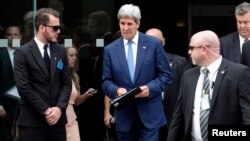U.S. Secretary of State John Kerry held more inconclusive meetings with his Iranian counterpart in Vienna Monday, as efforts continued to break the deadlock in talks on the future of Iran’s nuclear program.
Kerry had two meetings Monday with Iranian Foreign Minister Mohammed Javad Zarif, as talks also continued at a lower level between Iranian nuclear experts and officials from the six countries representing the United Nations.
Between sessions, Kerry had only a few words for reporters, who asked whether there was any progress.
“We are working away,” he said.
The talks are aimed at closing what Kerry called on Sunday significant gaps on key issues. Those are believed to include how much capacity Iran will have to enrich uranium, and how long the restrictions will last.
Enriching uranium is a key process in making fuel for civilian nuclear reactors, and also for building a nuclear bomb.
Iran says it has no intention of building a bomb, but the international community wants proof after decades of Iranian defiance and deception about its nuclear program.
The talks face a deadline on Sunday, but many experts expect that to be extended.
On Twitter, Zarif wrote that the two sides can reach a history-making deal before the deadline.
But even if Zarif and Kerry, and their technical experts, can find common ground, there is concern they will not be able to get such a deal approved back home. There is serious skepticism and some outright opposition to any deal among some in the U.S. Congress, and among some in Iran’s power establishment.
In recent days, Iran’s Supreme Leader, Ayatollah Ali Khameini said Iran needs to significantly increase its enrichment capacity to meet future energy needs. The international negotiators, and particularly the United States, are calling for a reduction in Iran’s capability for at least the next 10 years.
Iran expert Matthew Moran of London’s King’s College says, “The domestic political sphere in Iran is characterized by factionalism. Iranian politicians, like anywhere else, they will disagree over a whole range of issues. But around the nuclear issue there is consensus. Around nuclear advancement there is consensus. So it’s quite difficult to roll back.”
On the U.S. side, Paul Ingram of the British-American Security Information Council said the talks will face additional challenges if they extend too long.
“If they wait until it is too close to, or worse after, the mid-term elections in November, that will be a much harder time," he said. "So, I think in the short- to medium-term, in the next weeks and months, the Iranians will be needing a deal much more than the benefits they would get from trying to delay.
Kerry and Zarif are expected to meet again on Tuesday.










